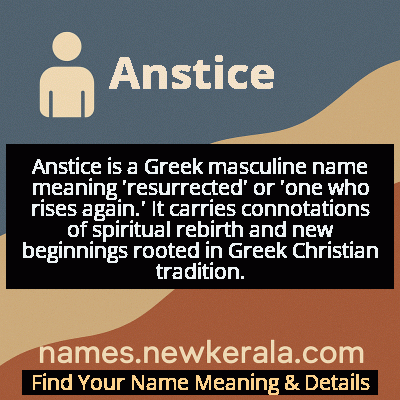Anstice Name Meaning & Details
Origin, Popularity, Numerology Analysis & Name Meaning of Anstice
Discover the origin, meaning, and cultural significance of the name ANSTICE. Delve into its historical roots and explore the lasting impact it has had on communities and traditions.
Name
Anstice
Gender
Male
Origin
Greek
Lucky Number
8
Meaning of the Name - Anstice
Anstice is a Greek masculine name meaning 'resurrected' or 'one who rises again.' It carries connotations of spiritual rebirth and new beginnings rooted in Greek Christian tradition.
Anstice - Complete Numerology Analysis
Your Numerology Number
Based on Pythagorean Numerology System
Ruling Planet
Saturn
Positive Nature
Ambitious, efficient, realistic, and authoritative.
Negative Traits
Materialistic, stressed, confrontational, and can be overly ambitious.
Lucky Colours
Dark blue, black.
Lucky Days
Saturday.
Lucky Stones
Blue sapphire, amethyst.
Harmony Numbers
2, 4, 6.
Best Suited Professions
Business leaders, managers, financial services, law enforcement.
What People Like About You
Leadership, determination, organizational skills.
Famous People Named Anstice
Anstice of Chios
Early Christian Saint
One of the early Christian martyrs in Greece, known for his steadfast faith during persecution
Anstice Brown
British Historian
Renowned classical scholar and translator of Greek philosophical texts
Anstice Johnson
Australian Architect
Influential architect known for blending Greek classical elements with modern design
Anstice Thomas
Botanist
Noted for his research on Mediterranean flora and Greek native plants
Name Variations & International Equivalents
Click on blue names to explore their detailed meanings. Gray names with will be available soon.
Cultural & Historical Significance
Extended Personality Analysis
Individuals named Anstice are often perceived as resilient and philosophical, embodying the name's meaning of resurrection through their ability to overcome challenges and reinvent themselves. They typically possess a deep, contemplative nature, drawn to exploring life's bigger questions and spiritual matters. This introspective quality is balanced by a practical resilience that allows them to navigate difficult circumstances with grace and determination. Anstice bearers often exhibit strong leadership qualities combined with empathy, making them natural mentors or guides. Their personality tends to reflect the Greek ideal of balanced character - thoughtful yet decisive, spiritual yet grounded. They are frequently seen as pillars of strength in their communities, known for their loyalty and ability to inspire others through difficult times. The name's association with rebirth often manifests in their creative problem-solving skills and adaptability to change. Many Anstices develop a calm, steady presence that others find reassuring, while maintaining an inner fire of passion and conviction that drives them to pursue their goals with remarkable persistence and vision.
Modern Usage & Popularity
In contemporary times, Anstice remains a relatively rare but meaningful choice, primarily used in Greek diaspora communities and by parents seeking classical names with spiritual significance. The name has seen a modest resurgence in recent years as part of the trend toward reviving ancient and meaningful names, particularly among families with Greek heritage seeking to preserve cultural identity. While it doesn't rank in most countries' top name lists, it maintains a steady presence in Greek Orthodox communities worldwide, especially in the United States, Australia, and Western Europe where Greek immigrants have settled. Modern usage often shortens to 'Stacey' as a nickname, though many bearers prefer the full classical form. The name appeals particularly to parents interested in names that combine Greek heritage with Christian symbolism, and it's increasingly chosen by those seeking unique but historically grounded names for their sons that stand out without being overly exotic. Digital globalization has also helped maintain the name's visibility, with social media allowing bearers to connect and share their name's significance across geographical boundaries.
Symbolic & Spiritual Meanings
Symbolically, Anstice represents transformation, renewal, and the triumph of life over adversity. The name carries the powerful metaphor of rising again, much like the phoenix from Greek mythology, symbolizing the ability to overcome challenges and emerge stronger. It embodies the concept of spiritual awakening and personal growth, representing the journey from darkness to enlightenment. In broader symbolic terms, Anstice signifies hope in difficult times, the promise of new beginnings, and the eternal cycle of death and rebirth. The name connects to natural symbols of regeneration like spring, dawn, and flowing water, all representing continuous renewal and the enduring nature of the human spirit through transformation. This symbolism extends to represent resilience in the face of adversity, the capacity for personal reinvention, and the philosophical understanding that endings often contain the seeds of new beginnings. The name serves as a living reminder that growth often requires periods of difficulty and that true strength emerges from the process of overcoming and transforming.

